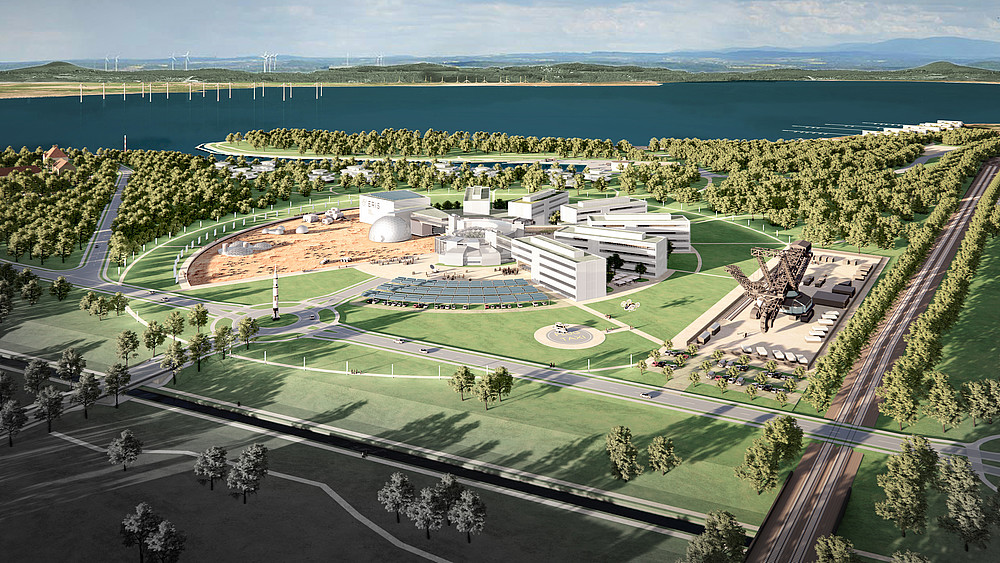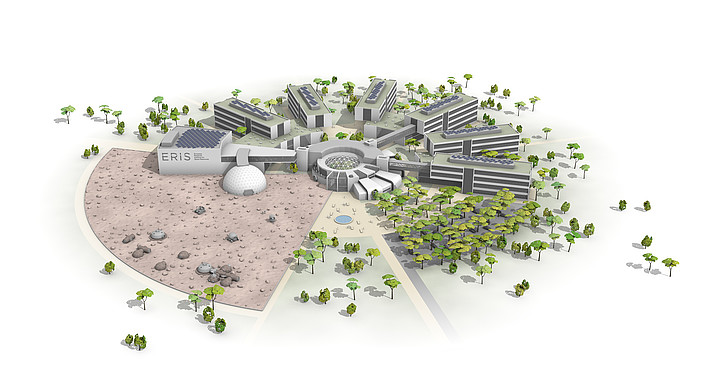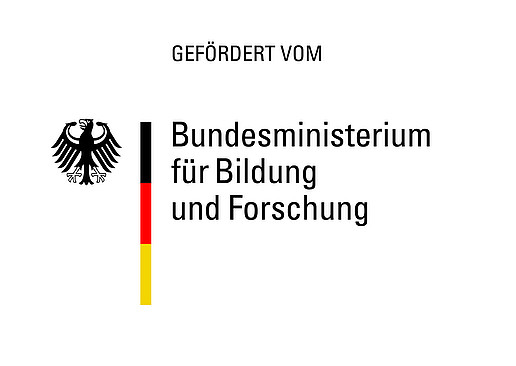HSZG is participating in the ERIS project. The aim of the project is to develop innovative solutions for technologies for future life on other planets and resource conservation on Earth.

With the "Knowledge creates prospects for the region!" initiative, the federal government and the Free State of Saxony are pursuing the goal of supporting structural change in Saxony's coal regions by establishing two new large-scale research facilities.
With the space technology project "European Research Institute for Space Resources - ERIS", a concept for such an institution is proposed that builds on existing expertise in the coal region and develops it further in a sustainable manner with a view to international growth markets.
In addition to many regional institutions, the Zittau/Görlitz University of Applied Sciences is also a partner in this project.
Prof. Dr.-Ing. Stefan Kornhuber discusses the background and the HSZG's research project ERIS in an interview:
Prof. Kornhuber, what is behind the ERIS project?
The idea with ERIS, but also with the Mars and moon expeditions, is not to be constantly dependent on supply modules from Earth, as with the ISS, but to set up the first station with only the bare essentials and then literally build 'everything' on site piece by piece with the available materials and produce food.
What contribution is the Zittau/Görlitz University of Applied Sciences making?
Energy is the basis of life in self-sufficient systems. The researchers at Zittau/Görlitz University of Applied Sciences are focusing on the electrical energy supply with a particular focus on the necessary safety and resilience of the systems. In addition, they are developing the necessary components from the available raw materials under the given special conditions, but also evaluating the economic viability of the solutions.
Could you go into this in more detail?
In order to enable self-sufficient life on other planets, energy in particular is required. Without oxygen, conventional combustion fails at this point. The same goes for wind power. That leaves electrical energy generated from photovoltaics. Our colleague Dr. Hartmut Stöcker from the TU Bergakademie Freiberg is making this research contribution.
In order to guarantee an electrical DC grid on which all life, including life support systems, depends, stable, self-sufficient and cellular autonomous as well as redundant and resilient energy grids are required, taking into account the generation and loads. The novelty compared to the ISS is the increased energy demand in food production and the provision of water and energy for production. Prof. Dr.-Ing. Uwe Schmidt from our Faculty of Electrical Engineering and Computer Science is working on the requirements and ensuring the necessary electrical grid.
In order to be able to manufacture, construct and operate the corresponding energy systems on site, taking into account the environmental conditions, in particular pressure and cosmic radiation, suitable materials must be found and qualified with the available raw materials in order to be able to realize the systems with the corresponding energy density. This applies in particular to switching and cable systems, but also to components as we know them from "domestic installations". I am responsible for this area of electrical components in the team.
In addition, as was introduced at NASA decades ago, solution options should be subjected to an economic evaluation before they are implemented. The aim is to find an optimum solution in terms of technology and costs. Prof. Dr. Tino Schütte from the Faculty of Economics and Industrial Engineering is working on this.
What added value does the project offer in addition to the prospective use of innovative technologies on other planets?
With the knowledge gained from available boundary conditions to create a self-sustaining system, corresponding new approaches can also be developed on Earth to minimize the use of raw materials and become less dependent on previously scarce and critical resources.
The TU Bergakademie Freiberg recently published the following press release on ERIS:
Whether satellite systems, precise positioning technology or the finest sensors - high technologies from space research are already shaping our everyday lives today. But they can do much more for a sustainable and resource-conserving life on Earth. In the ERIS project, scientists at TU Bergakademie Freiberg, together with partners from space research and technology as well as from raw materials, energy, materials and production research, want to develop technologies that not only meet the conditions on other planets, but also offer innovative solutions for current challenges on Earth.

ERIS enables state-of-the-art space research in Saxony
If successfully approved by the BMBF and the Free State of Saxony, ERIS could become one of two new large-scale research centers in the Saxon coal regions. This will open up new economic prospects and high-tech locations for industry with numerous jobs.
In the technology center, which is equipped with state-of-the-art simulators for planetary surfaces and habitat technologies as well as robotic and autonomous systems, scientists will develop processes and methods for the construction of self-sustaining space stations, among other things. These include, for example, new 3D printing processes, artificially intelligent production systems and self-sufficient supply and energy systems without emissions and waste. "This will make it possible to build space stations directly on the moon from the available material and supply them self-sufficiently under the extreme conditions," explains Prof. Drebenstedt, TUBAF spokesperson for ERIS. The first construction and test missions could become a reality in the not too distant future. After all, new moon and Mars missions are already planned for 2025 by NASA, ESA and other private companies.
New research and study prospects for doctoral candidates and students
Successful implementation of the project will not only open up new prospects in Lusatia, but also for students and doctoral candidates at TU Bergakademie Freiberg. This is because the development of space technologies not only requires knowledge from the aerospace industry, but above all from the fields of natural and engineering sciences, mathematics, computer science and robotics, mechanical engineering, energy and process engineering as well as materials science and economics. New degree courses and teaching concepts are also planned that combine all the necessary fields.
The best two concepts in the "Knowledge creates prospects for the region!" competition are expected to be selected at the end of September 2022. Further information can be found on the ERIS website.
